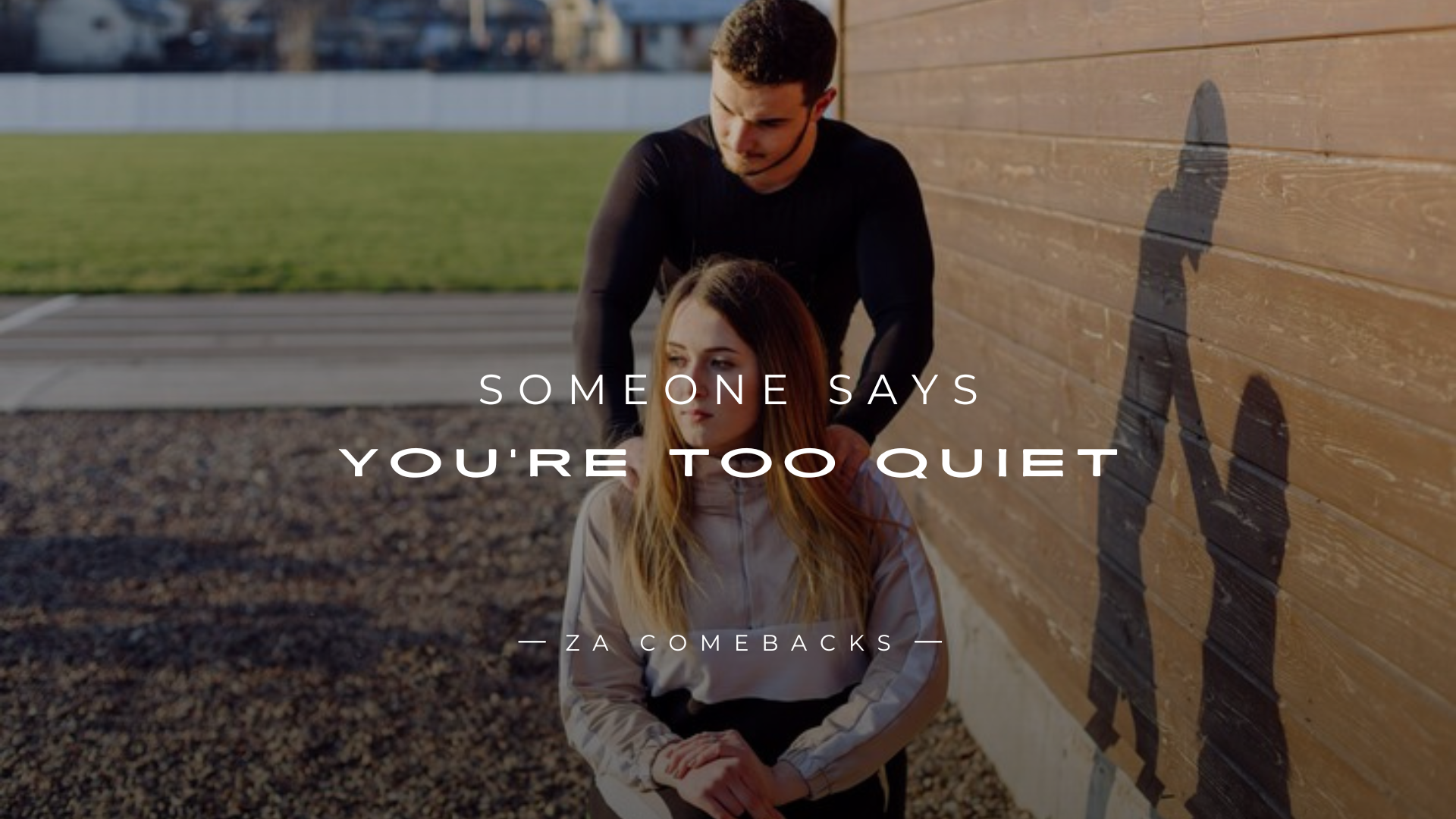Have you ever been in a situation where someone casually says, “You’re too quiet“? This comment can be particularly jarring if you enjoy silence or don’t feel the need to speak all the time. It might make you feel like you’re being judged or misunderstood. But how should you respond when someone points out your quiet nature? In this article, we’ll explore some witty, confident, and thoughtful comebacks for the comment “You’re too quiet” and why embracing your quieter side is important.

150+ Comebacks for Someone Says You’re Too Quiet
Playful and Lighthearted
- I’m just saving my words for when they really count!
- You’re right, I’m just waiting for the perfect moment to strike with wisdom.
- I’m too busy listening to how brilliant you are.
- Quiet is my superpower—watch and be amazed.
- I’m letting my silence create suspense.
- I only speak when absolutely necessary… or when there’s pizza involved.
- I like to leave a little mystery—keeps things interesting!
- My words are like fine wine—they take time to age.
- I’m just enjoying the sounds of everyone else for now.
- I’m saving up for a big reveal!
Confident and Assertive
- I don’t need to speak to be noticed; my presence speaks for itself.
- Being quiet doesn’t mean I’m shy. I just choose my moments.
- I’m comfortable in silence, and you should be too.
- You don’t have to be loud to make an impact.
- I’m just giving everyone else the chance to talk.
- I don’t waste words. I speak when I have something important to say.
- My silence is intentional. I’m confident enough to not fill the air with chatter.
- Quiet doesn’t mean weak, it just means I’m selective about my words.
- I don’t need to shout to be heard.
- Sometimes silence is louder than words.
Sarcastic or Witty
- Oh, my bad! I thought this was a ‘listening’ moment, not a ‘talking’ competition.
- You’re right! I should just start narrating my every thought. Hold on, I’ll start now.
- I didn’t know you were in charge of how much I talk. Thanks for the tip!
- I’ll just turn up the volume so you can hear the gears turning in my head.
- I’m conserving my energy for something really important… like a nap.
- Oh, I’m sorry, I didn’t realize I needed permission to be quiet.
- Well, what do you know—being quiet is actually one of my hobbies.
- Who needs noise when you can have a perfect moment of silence?
- I’m just trying to set the world record for longest pause in a conversation.
- I’m saving my voice for when I have something really profound to say.
Reflective or Thoughtful
- Sometimes silence is the best way to understand everything that’s going on.
- I’m just processing the world around me—sometimes words come after that.
- I believe in quality over quantity when it comes to speaking.
- I like to listen more than talk; that’s where the real learning happens.
- Sometimes being quiet helps me think about things more deeply.
- I prefer to reflect before I speak, so I can say something meaningful.
- I value silence because it allows me to fully appreciate the conversation.
- I’m not quiet because I have nothing to say, I’m just considering the best way to say it.
- I believe the best ideas often come in moments of stillness.
- Being quiet helps me stay grounded and aware of everything around me.
Defensive or Protective
- There’s nothing wrong with being quiet. I’m fine just the way I am.
- Why does my quietness bother you? I’m allowed to be quiet if I choose.
- I don’t have to talk all the time to be relevant or involved.
- I’m not obligated to speak just to meet your expectations.
- Why is my silence a problem for you? I think it’s quite peaceful.
- Being quiet doesn’t mean there’s an issue, it just means I’m comfortable in my own skin.
- It’s interesting that my quietness bothers you. Maybe you should try being quiet too.
- I’m perfectly fine being quiet. Why is that so hard to understand?
- I choose to speak only when I have something meaningful to say.
- Not everyone needs to talk to be important or heard.
Humorous
- I’m too busy processing all the awesome things I’ve learned from you.
- I’m just saving up for a big conversation later!
- I’m not quiet, I’m just in ‘thinking mode’—it’s intense in here.
- I’m just waiting for my next big laugh to make it worth speaking.
- I’m not quiet, I’m just plotting my next witty remark.
- Sometimes silence is just the sound of a genius at work.
- I talk less so I can keep my reputation as the mysterious one intact.
- Quietness is my secret weapon. I’m planning something great.
- I like to leave a little mystery. Keeps things fun!
- I’m conserving my words for when they can really rock the room.
Philosophical or Deep
- In the stillness of silence, we find the deepest thoughts.
- Silence is the canvas on which the mind paints its most profound ideas.
- Sometimes being quiet is the loudest thing we can do for the world.
- In quiet moments, we listen to the truths that words cannot express.
- I find peace in silence. It’s where my best thoughts are born.
- Sometimes the most important conversations happen in the silence between words.
- The quietest people often hold the deepest wisdom.
- In silence, we find clarity; in noise, we find confusion.
- Words are often unnecessary when the mind is deeply engaged.
- Quietness doesn’t mean emptiness—it’s full of reflection and understanding.
Curious or Inquisitive
- Why does my quietness bother you? What’s wrong with enjoying silence?
- Is there something wrong with being quiet, or is it just uncomfortable for you?
- Do you think I should speak more, or do you just prefer more noise?
- Why does my being quiet make you feel the need to point it out?
- I’m curious—why does my silence stand out to you so much?
- What makes you think my quietness means something’s wrong?
- Do you think silence is awkward, or are you just used to noise?
- I’m just wondering—why do you feel the need to comment on my quietness?
- Is it the quiet that bothers you, or just the fact that you can’t control it?
- Why is being quiet considered strange? I think it’s peaceful.
Compliment-Based
- I don’t need to be loud to leave a lasting impression.
- Thank you for noticing! My quietness means I’m truly focused.
- Sometimes, silence is the most powerful way to show respect.
- I choose to be quiet so I can listen and learn more from others.
- I like to observe, and often, the best ideas come in the quiet moments.
- I prefer to let my actions speak for me instead of words.
- Being quiet allows me to appreciate the brilliance of others.
- I may be quiet, but my mind is always active.
- I’m quietly gathering wisdom while you’re busy talking.
- Thank you for noticing—sometimes silence is just my way of being thoughtful.
Challenging the Assumption
- Just because I’m quiet doesn’t mean I’m not interested.
- Maybe I’m not talking because I have nothing to say—at least for now.
- What makes you think that quiet means something’s wrong?
- Why assume I’m quiet because I’m shy? Maybe I’m just observing.
- Who says being quiet is a bad thing? I think it has its own strength.
- Do you ever consider that silence might mean I’m processing things deeply?
- Not every silence needs to be filled with words.
- Maybe I just prefer listening and learning before speaking.
- What if I’m just enjoying the moment in quiet?
- My quietness isn’t an issue—it’s just my natural state.
Self-Aware / Humble
- I guess I’m just more of an introvert, but I’m working on it.
- I’m a thinker, and sometimes it takes me a while to form my thoughts.
- I’m just giving you all the space to shine—I’ll speak when I need to.
- It’s not that I’m quiet—I just prefer to listen and learn first.
- I know I can be quiet sometimes, but I’m working on finding my voice.
- I’ve always been more of a listener—sometimes it’s just my nature.
- It’s a habit I’ve developed; I tend to think before I speak.
- I guess I’m more comfortable in silence, but I’m still learning how to speak up.
- I’m just being true to myself—being quiet helps me recharge.
- Sometimes, it’s better to stay quiet and let others express themselves first.
Creative / Artistic
- Silence is like a blank canvas—I’m waiting for the right moment to create something beautiful.
- I find inspiration in the quiet—it helps me think of my next great idea.
- Sometimes my silence is just me composing my next masterpiece.
- The quiet allows my creativity to flow without distractions.
- Like a painter with a blank canvas, I’m waiting for the perfect colors to speak.
- Silence is the space where I’m creating the next big thing.
- I’m quiet now, but that’s just the calm before my creative storm.
- Sometimes, the best art comes from moments of reflection and silence.
- I like to think of my silence as a quiet preparation for something creative.
- In the stillness, my mind is already at work on my next creative project.
Empowering / Motivational
- Not everyone needs to be loud to be heard—sometimes silence is strength.
- I may be quiet, but I’m strong enough to not need constant attention.
- Quiet doesn’t mean I’m weak. It means I’m choosing when to speak wisely.
- I don’t need to talk all the time to prove I’m powerful.
- Sometimes, silence gives me the clarity I need to be stronger when I do speak.
- I’m quietly building my own strength, waiting for the right moment to show it.
- Being quiet doesn’t mean I’m not confident. I’m just confident enough to let my silence speak.
- Quietness is not a weakness—it’s my way of conserving my energy for what matters.
- The quiet ones are often the ones who change the world when they finally speak.
- In silence, I find my power and purpose.
Sarcastic Reversal
- Oh, so now I need a permission slip to be quiet? Got it!
- Thanks for the feedback! Maybe I should just start shouting instead.
- I guess I’ll start working on my ‘loud and obnoxious’ routine.
- If you’d like, I can just make random noise to make you feel better.
- You’re right—let me just turn up the volume so I’m more ‘social.’
- Sorry, I didn’t realize being quiet was such a crime.
- Okay, I’ll stop being so quiet. Let me know when you need a break from the noise.
- Oh, you’re right! I’ve been way too silent. Let me start over with a dramatic monologue.
- I’m sorry, I didn’t realize my silence was so upsetting to you. Let me fix that.
- Guess I’ll just keep talking until you think I’m interesting enough!
Situational/Contextual
- I’m quiet because I’m just observing the situation—I’ll speak when I have something to add.
- I’m waiting for the right moment to jump in—no need to rush me.
- Right now, I’m just taking it all in. I’ll join the conversation when I’m ready.
- Sometimes the quiet moments are the best ones. I’m just enjoying the peace.
- I’m not ignoring you—just reflecting on what’s being said.
- This situation calls for listening, not talking. I’ll speak up when I have something meaningful to contribute.
- I don’t need to talk right now. I’m comfortable with just being here.
- Being quiet allows me to understand the dynamics of the conversation before I respond.
- Sometimes, it’s more appropriate to remain quiet—don’t worry, I’ll chime in when it’s needed.
- I’m letting everyone else take the floor right now—don’t worry, I’ll get my turn.
What Does “You’re Too Quiet” Really Mean?
When someone says, “You’re too quiet,” it’s often an observation based on their own expectations or comfort levels with conversation. But what does it really mean? In many cases, people use this phrase because they expect everyone to be talkative, lively, or outspoken in social situations. For some, quietness can be seen as awkwardness or a lack of engagement. However, in reality, it’s just a personality trait, and it doesn’t have to carry any negative connotations.
The Common Misconception About Quiet People
There’s a stereotype that quiet people are shy, unfriendly, or boring. But that’s far from the truth! Quietness doesn’t equate to being antisocial or lacking personality. In fact, many quiet people are deep thinkers, excellent listeners, and quite observant. They may simply prefer not to dominate conversations. Sadly, society often places value on being loud or extroverted, and quiet people can sometimes be unfairly categorized as “too quiet” without anyone taking the time to understand them fully.
Reasons Why Someone Might Say “You’re Too Quiet”
There are a few reasons why people might comment on your quiet nature. Sometimes, it’s because they feel uncomfortable with silence or expect everyone to fill the space with words. Other times, they might say it because they are insecure about themselves and need validation through social interaction. The comment can also stem from societal pressure to be more “outgoing” or “approachable.” Understanding where the comment is coming from can help you decide how to respond.
How to Respond to “You’re Too Quiet”
When someone says, “You’re too quiet,” your response will depend on the context and the person making the comment. Are they joking? Are they genuinely curious? Or is there an underlying criticism? Once you understand the intent behind their words, you can decide the best way to respond. It could be a playful quip, a confident statement, or even a more serious conversation about quietness and personality types.
Comedically Comebacks for Someone Says You’re Too Quiet
Sometimes, the best way to respond to “You’re too quiet” is with a sense of humor. A little humor can deflect the comment and lighten the mood. Here are some comebacks you might want to try:
- “I’m just conserving my energy for something really important, like binge-watching my favorite show.”
- “I’m just letting the conversation sink in. Don’t worry, I’ll speak soon enough.”
- “I’m just here for the vibes, not the noise.”
These responses show that you don’t take the comment too seriously and are comfortable with who you are.
Confident Comebacks for Someone Says You’re Too Quiet
Sometimes, you might want to respond in a more assertive way, standing your ground while still being polite. Here’s how you can respond confidently:
- “I like to listen more than speak, but that doesn’t mean I’m not engaged.”
- “Quietness is a sign of being thoughtful, not shy.”
- “Being quiet doesn’t mean I have nothing to say, just that I choose my words carefully.”
These comebacks help establish your quiet nature as a positive trait while also letting others know that their comment doesn’t bother you.
Sarcastic Comebacks for Someone Says You’re Too Quiet
If you’re feeling a bit cheeky and want to turn the tables, a sarcastic response can do the trick. Here are a few to consider:
- “Wow, what gave it away? My silence or the fact that I’m not talking over everyone?”
- “I’m saving my words for something really important, like telling you how annoying you are.”
- “I’m actually giving the world a break from all my wisdom.”
Sarcasm can be an effective way to deflect unnecessary comments and make the situation more lighthearted.
Thoughtful Comebacks for Someone Says You’re Too Quiet
If you prefer a more thoughtful and introspective response, you could explain why you are quiet or discuss the nature of introversion:
- “I enjoy listening and observing. It helps me understand people better.”
- “I don’t need to fill every silence with words to have a good time.”
- “Being quiet allows me to reflect deeply, which is important for my personal growth.”
These responses invite conversation about introversion and challenge the misconception that quietness is a flaw.
Empathetic Comebacks for Someone Says You’re Too Quiet
In some cases, the person who says you’re too quiet might just be trying to engage with you. In these situations, empathy is key:
- “I understand it might seem quiet to you, but I’m more of a listener. I prefer letting others speak.”
- “I appreciate you trying to get me to talk, but sometimes I’m just not in the mood for a long conversation.”
- “We all have different ways of communicating. I tend to be more reserved, but that doesn’t mean I’m not interested.”
These empathetic responses can help diffuse the situation and make the person feel understood.
When to Stay Silent and Not Respond
There are times when the best response is no response at all. If the comment is made by someone who doesn’t deserve your energy or if the situation feels too trivial, it might be best to simply smile and move on. Not every comment requires a comeback, and sometimes letting things slide is the most peaceful option.
How to Deal with Feeling Misunderstood
It can be frustrating to feel misunderstood because of your quiet nature. But remember, your personality is a valuable part of who you are. If others don’t understand or appreciate it, that’s their loss. Embrace your quietness and recognize that being misunderstood is a part of life. The more comfortable you are with yourself, the less the opinions of others will affect you.
The Power of Being Quiet
There are numerous benefits to being quiet. Quiet people are often great listeners, observant, and thoughtful. They can make valuable contributions when they choose to speak. Quietness can also create a calming presence in group settings and allow for deeper reflection. It’s not a weakness – it’s a strength.
Changing the Narrative About Quiet People
Quiet people often get overlooked or misunderstood. But we can work together to change the narrative and make the world more accepting of introverted personalities. Being quiet doesn’t mean being uninteresting or unfriendly. It simply means that someone values thoughtfulness over loudness. By embracing this, we can help shift societal views on quietness and create more space for all personalities.
Conclusion
In conclusion, being called “too quiet” can be frustrating, but with the right comebacks, you can handle these situations with confidence and wit. Whether you want to keep things lighthearted or assert your boundaries, these 150+ comebacks offer a variety of responses to fit your personality and situation. Remember, silence can be powerful, and you don’t have to justify your quiet nature to anyone. If you’re dealing with someone who makes fun of you instead, check out our guide on Someone Who Makes Fun of You: 150+ Comebacks to Use for even more clever ways to respond.
FAQs
Q. Why do people say “You’re too quiet”?
People often say this because they expect others to be talkative or outgoing in social situations, not understanding that everyone has different communication styles.
Absolutely! Quietness is a personality trait, not a flaw. Many quiet individuals are deep thinkers, great listeners, and highly observant.
Q. How do I handle being misunderstood because of my quietness?
The best way to handle it is to embrace your quiet nature and be comfortable with who you are. Educate others if needed, but remember that being quiet has many strengths.
Q. Should I respond when someone says “You’re too quiet”?
It depends on the situation. Sometimes, a witty or confident response can help, but in other cases, it may be best to simply let it slide.
Q. What’s a good way to change the stereotype of being quiet?
By showing others the value in being a good listener, thinker, and observer, you can help shift the narrative and encourage people to appreciate quieter personalities.









